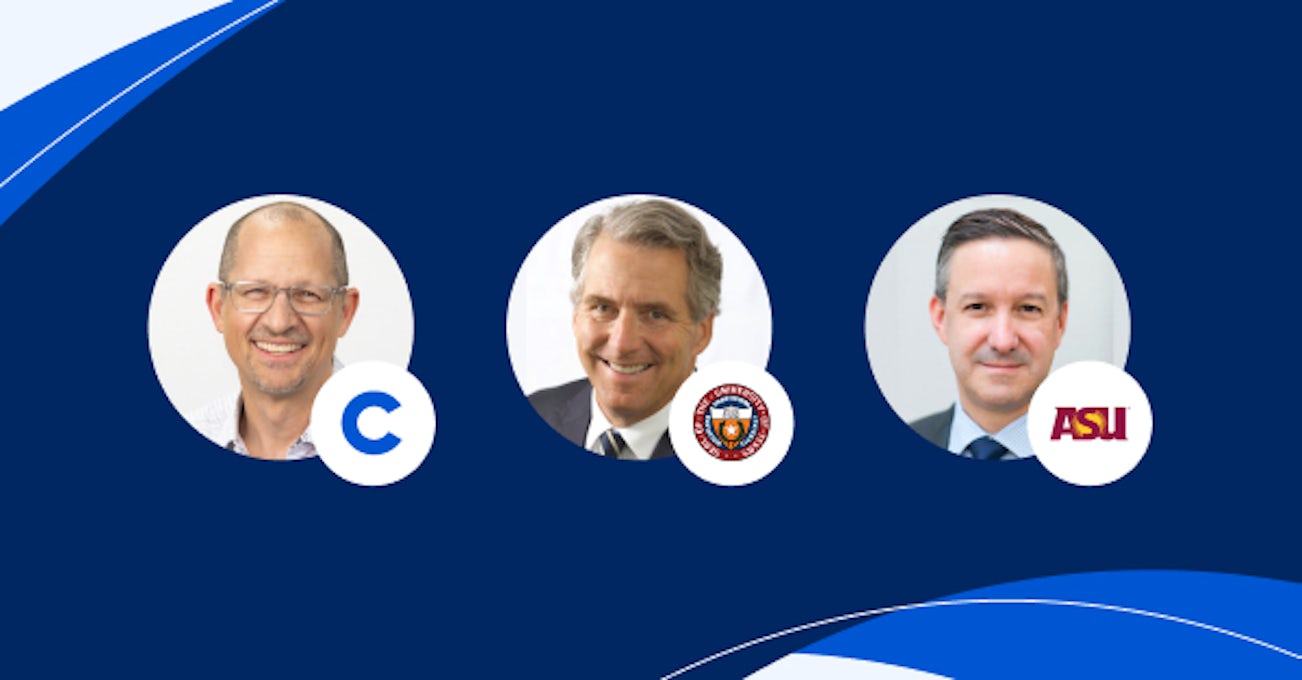ASU+GSV Summit 2024: Transforming Higher Education with Micro-Credentials
At the 2024 ASU+GSV Summit, Coursera CEO Jeff Maggioncalda and University of Texas System Chancellor James B. Milliken explored the role of micro-credentials in fostering lifelong learning through higher education, in conversation with ASU's Jeff Selingo.

How can universities adapt to the ever-changing needs of students and employers? This critical question fueled the fireside chat “Texas Tea: Transforming Higher Ed with Workforce Micro-Credentials” at this year's ASU+GSV Summit held in San Diego.
Coursera CEO Jeff Maggioncalda and UT System Chancellor James B. Milliken spoke to a packed room of 800 attendees, focusing on the value micro-credentials provide—and how the innovative partnership between Coursera and UT System champions that.
In 2023, UT System integrated Coursera micro-credentials into its degree programs, offering 256,000 students, alumni, faculty, and staff across nine campuses access to in-demand skills from industry giants like Google, Microsoft, IBM, and Meta. This makes it one the largest initiatives of its kind in US higher education.
UT System is committed to providing micro-credentials, with plans to offer 50,000 credentials through Coursera by next year. The reason?
Boosted employability: Micro-credentials equip students, alumni, and faculty with in-demand skills, closing the gap between academia and the job market.
Increased agility: Institutions can quickly adapt to evolving industry needs and offer cutting-edge training.
Expanded access: Micro-credentials provide flexible learning pathways for non-traditional students.
Micro-credentials boost employability and bridge skill gaps for students and alumni
Chancellor Milliken believes micro-credentials are essential for students seeking to graduate job-ready and for alumni navigating career changes. Coursera’s Jeff Maggioncalda echoes this sentiment, saying, "In today's economy, opportunity will increasingly depend on having skills that companies value...and the bar for what you need to know and be able to do is rising rapidly.”
Heard at the conference: A subscription model for lifelong learning?
Could higher education act like a subscription service, where alumni return to their alma mater throughout their careers? This will empower them to upskill and adapt in evolving job markets.
Micro-credentials help institutions quickly adapt to an evolving world with evolving demands
With declining public trust in higher education and rapidly evolving workforce needs, higher education must adapt. Milliken sees micro-credentials as central to this transformation.
"This isn't about us—it's about how well we serve learners," Milliken emphasizes, highlighting the need to prioritize student needs and job market demands.
Micro-credentials offer a flexible, cost-effective way to achieve this, providing targeted skills valued by both employers and learners. Research from Coursera reveals 90% of employers prefer candidates with both a degree and a Professional Certificate, seeking employees who are broadly educated and specifically skilled.
UT System is responding to this demand by incorporating Coursera content into its curriculum, offering in-demand skills from industry leaders like Salesforce, Meta, and Google across a range of fields.
Micro-credentials can offer alternative learning paths for non-traditional learners
Chancellor Milliken stresses the importance of offering flexible pathways to graduates with some college credit but no degree—a population of 40 million in the US. He advocates for micro-credentials as a solution to help these individuals upskill, gain valuable credentials, and advance their careers.
UT System's commitment to providing micro-credentials for non-traditional learners highlights the transformative potential these programs hold for millions seeking career advancement. Institutions, faculty, and industry partners must collaborate to drive innovation and expand the reach of micro-credentials, empowering even more learners.
Heard at the conference: Can micro-credentials help learners in debt?
Millions of students are burdened by student loan debt without experiencing the expected career and financial benefits often associated with a college degree. Degree programs aren't enticing them back, and demanding a return to four-year programs is impractical. We need alternative solutions like micro-credentials, which can quickly equip students with in-demand skills for career advancement.
Empower your students and staff with industry-recognized skills
- Learn: Access job-aligned Professional Certificates from world-class leaders
- Integrate: Support faculty in embedding micro-credentials into existing courses and programs
- Apply: Provide students with faculty-coached, hands-on learning experiences that reinforce certificate skills
This content has been made available for informational purposes only. Learners are advised to conduct additional research to ensure that courses and other credentials pursued meet their personal, professional, and financial goals.
